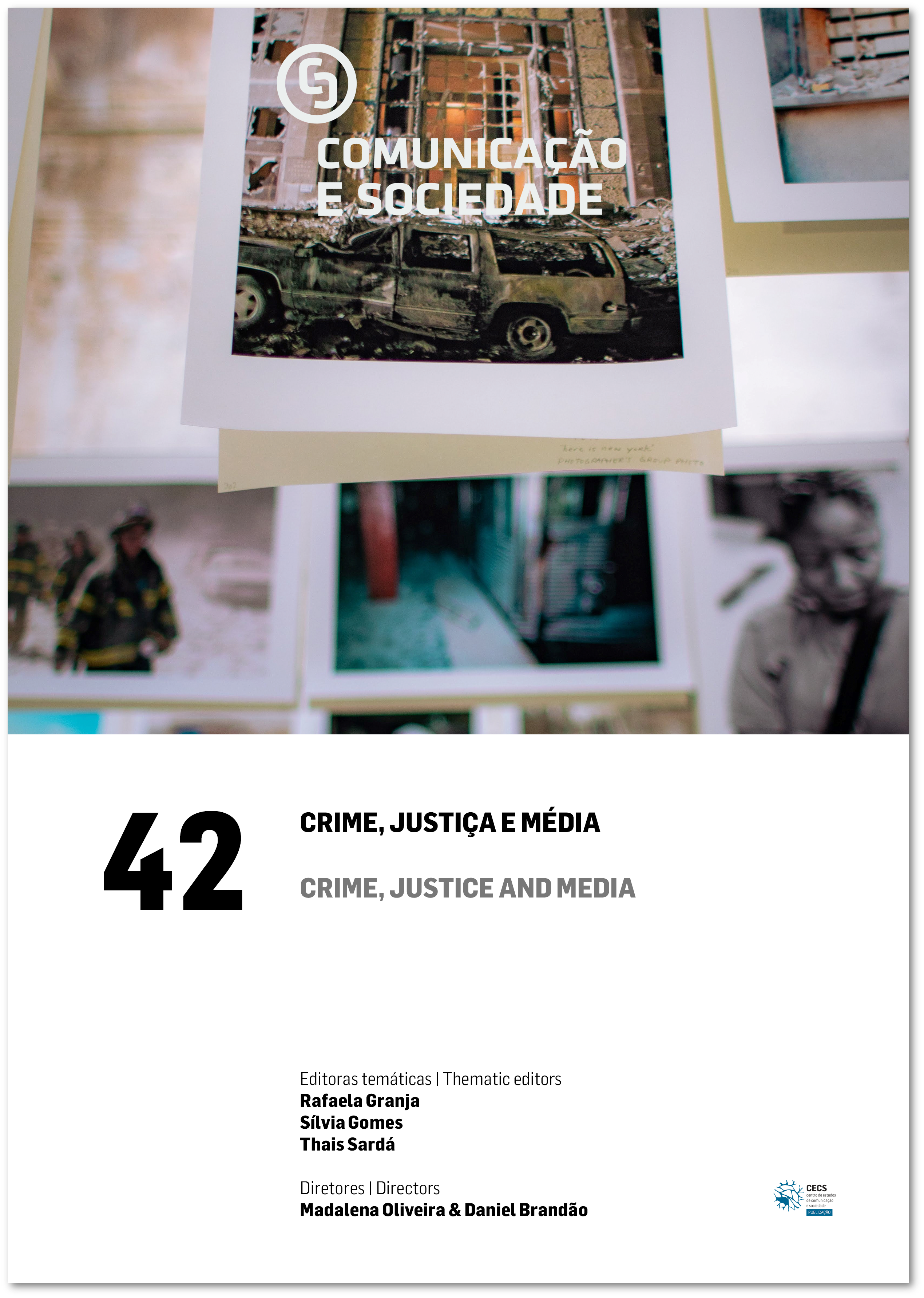The Universal Church of the Kingdom of God in the News: Melodrama and Factual Record
DOI:
https://doi.org/10.17231/comsoc.42(2022).3964Keywords:
social representations, journalism, Universal Church of the Kingdom of God, melodrama, soap operasAbstract
The controversial establishment of the Universal Church of the Kingdom of God in Portugal was the subject of many news reports during the 1990s, in which accusations of serious crimes — from charlatanism to connections to drug trafficking and child abduction — filled the pages of newspapers (G. M. Dias, 2006; R. A. S. Dias, 2016; Farias, 1999; Farias & Santos, 1999; Júnior, 2013; Machado, 2003). Many of these news reports linked the Church with stereotypes about Brazil and Brazilians and referenced Brazilian soap operas, which were quite popular in the country at the time. To observe whether these characteristics have been maintained over the years, the author analysed reports published by the influential newspapers Público and Expresso from the early 21st century (2001 and 2002), in 2010 and 2017, respectively. Inspired by critical discourse analysis and framing analysis, and with the theoretical support of the theory of social representations, such analyses allowed the author to conclude that the characteristics identified in the 1990s remained, although the Church’s media presence has since reduced. In turn, the reference to soap operas manifests in the fabric of journalistic discourse, with a hybridisation formed between the melodramatic and informational genres.
Downloads
References
Almeida Revista e Corrigida. (2009). Sociedade Bíblica do Brasil. https://www.biblegateway.com/passage/?search=Jo%C3%A3o%202%3A13-16&version=ARC
Amaral, M. F. (2007). Oh, meu Deus! Manchetes e singularidades na matriz jornalística melodramática. Revista Eco-Pós, 10(2), 113–127. https://doi.org/10.29146/eco-pos.v10i2.1021
Baptista, C. (2018). Tendências do jornalismo de investigação televisivo a partir do estudo de caso da reportagem da TVI “Segredo dos Deuses”. Media & Jornalismo, 18(32), 95–104. https://doi.org/10.14195/2183-5462_32_7
Bosco, F. (2017). A vítima tem sempre razão? Lutas identitárias e o novo espaço público brasileiro. Todavia.
Burnay, C. (2005). A telenovela e o público: Uma relação escondida. Media & Jornalismo, 6, 95–110. http://hdl.handle.net/10400.14/15051
Cunha, I. F. (2005). A mulher brasileira na televisão portuguesa. In A. Fidalgo & P. Serra (Eds.), Actas do III Sopcom, VI Lusocom e II Ibérico (Vol. III; pp. 535–553). Universidade da Beira Interior.
Dias, G. M. (2006). Expansão e choque: A IURD em Portugal. In I. J. R. Machado (Ed.), Um mar de identidades. A imigração brasileira em Portugal (pp. 299–323). EdUFSCar.
Dias, R. A. S. (2016). Povos irmãos? Brasileiros em Portugal: Disputas e negociações identitárias (1986-2007) [Tese de doutoramento, Instituto Universitário de Lisboa]. Repositório do Iscte – Instituto Universitário de Lisboa. http://hdl.handle.net/10071/14393
Duby, G. (1993). O tempo das catedrais: A arte e a sociedade 980-1420 (J. Saramago, Trad.). Editorial Estampa. (Trabalho original publicado em 1976)
Entman, R. M. (1993). Framing: Toward clarification of a fractured paradigm. Journal of Communication, 43(4), 51–58. https://doi.org/10.1111/j.1460-2466.1993.tb01304.x
Farias, M. H. (1999). The siege of Oporto’s coliseum. The Universal Church of the Kingdom of God and Portuguese media. CESNUR – Center for Studies on New Religions. https://www.cesnur.org/testi/bryn/br_farias.htm
Farias, M. H., & Santos, T. (1999). Novos movimentos religiosos em Portugal: Passado, presente e future. Revista Sociedade e Estado, XIV(l), 203–214.
Ferreira, R. M. C. (2014). Uma história das audiências das telenovelas portuguesas e brasileiras em Portugal. Estudos em Comunicação, 16, 149–186. http://www.ec.ubi.pt/ec/16/pdf/EC16-2014Jun-07.pdf
Garrard-Burnett, V. (2011). A vida abundante: A teologia da prosperidade na América Latina. História: Questões & Debates, 55, 177–194. https://revistas.ufpr.br/historia/article/view/26546
Hall, S. (1990). Cultural identity and diaspora. In J. Rutherford (Ed.), Identity: Community, culture, difference (pp. 227–237). Lawrence & Wishart.
Hoijer, B. (2011). Social representations theory. A new theory for media research. Nordicom Review, 32, 3–16.
Júnior, P. G. (2013). “Do reino de Deus às portas do inferno”: A migração brasileira, liberdade religiosa e a transnacionalização do pentecostalismo para Portugal. Revista Migrações, 11, 185–211.
Lippmann, W. (1998). Public opinion (2.ª ed.). Macmillan. (Trabalho original publicado em 1922)
Machado, I. J. R. (2003). Cárcere público: Processos de exotização entre imigrantes brasileiros no Porto [Tese de doutoramento, Universidade Estadual de Campinas]. Repositório da Unicamp – Universidade Estadual de Campinas. http://repositorio.unicamp.br/Acervo/Detalhe/286795
Mafra, C. (2002). Na posse da palavra: Religião, conversão e liberdade pessoal em dois contextos nacionais. Instituto de Ciências Sociais da Universidade de Lisboa.
Malheiros, J. M. (2007). Imigração brasileira em Portugal. Alto Comissariado para Imigração e Diálogo Intercultural – ACIDI.
Martín-Barbero, J. (1997). Dos meios às mediações: Comunicação, cultura e hegemonia. Editora UFRJ.
Moscovici, S. (1988). Notes towards a description of social representation. European Journal of Social Psychology, 18, 211–250. https://doi.org/10.1002/ejsp.2420180303
Noelle-Neumann, E. (1991). The theory of public opinion: The concept of the spiral of silence. Annals of the International Communication Association, 14(1), 256–287. https://doi.org/10.1080/23808985.1991.11678790
Pais, J. M. (2010). “Mães de Bragança” e feitiços: Enredos luso-brasileiros em torno da sexualidade. Revista de Ciências Sociais, 41(2), 9–23. http://www.periodicos.ufc.br/revcienso/article/view/455
Pauly, J. J. (2014). The new journalism and the struggle for interpretation. Journalism, 15(5), 589–604. https://doi.org/10.1177%2F1464884914529208
Quijano, A. (1992). Colonialidad y modernidad/racionalidad. Perú Indígena, 13(29), 11–20.
Rosenfeld, A. (2005). Literatura e personagem. In A. Candido, A. Rosenfeld, D. A. Prado, & P. E. S. Gomes (Eds.), A personagem de ficção (pp. 9–49). Editora Perspectiva.
Santos, B. S. (2001). Entre próspero e caliban: Colonialismo, pós-colonialismo e interidentidade. In M. I. Ramalho & A. S. Ribeiro (Eds.), Entre ser e estar. Raízes, percursos e discursos da identidade (pp. 23–79). Edições Afrontamento.
Serviço de Estrangeiros e Fronteiras. (s.d.). Relatórios estatísticos anuais. SEF Stat. https://sefstat.sef.pt/forms/relatorios.aspx
Silva, L. (2013). Melodrama e telenovela: Dimensões históricas de um gênero/formato. In Anais do 9º Encontro Nacional de História da Mídia (pp. 1–14). Alcar.
Teo, P. (2000). Racism in the news: A critical discourse analysis of news reporting in two Australian newspapers. Discourse & Society, 11(1), 7–49. https://doi.org/10.1177%2F0957926500011001002
van Dijk, T. A. (2002). Cognição, discurso e interação. Contexto.
Downloads
Published
How to Cite
Issue
Section
License
Copyright (c) 2022 Ester Amaral de Paula Minga

This work is licensed under a Creative Commons Attribution 4.0 International License.
Authors own the copyright, providing the journal with the right of first publication. The work is licensed under a Creative Commons Attribution 4.0 International License.











